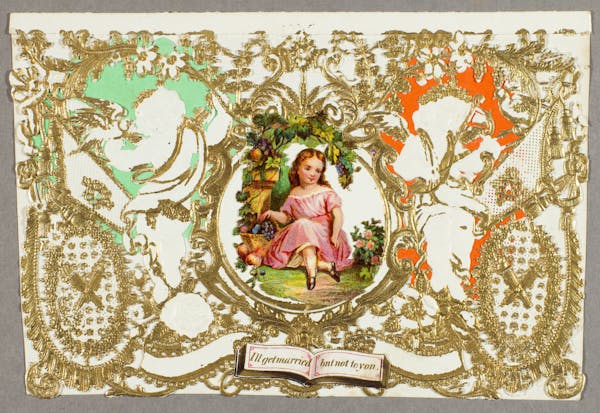Ever since people have been falling in love, they've been coming up with pet names for each other.
And not for naught. It turns out that those cutsey, affectionate nicknames actually serve an important sociological function: They strengthen our relationships.
That's what Carol J. Bruess, professor emeritus of communication and journalism at the University of St. Thomas in St. Paul, discovered while researching her master's thesis, " 'Sweet Pea and 'Pussy Cat': An Examination of Idiom Use and Marital Satisfaction Over the Life Cycle."
Idiosyncratic communication (that's ivory tower-speak for terms like Cutie Patootie) leads to happier, longer-lasting relationships, according to the thesis. "Satisfied husbands and wives report [the use of] more idioms than unsatisfied spouses."
For people who are oratorically shy, however, that's easier said than done. So on this day devoted to lovers, here's an overview of the many categories of pet names.
Saccharine
This category includes any nickname with syrupy sentimentality. Honey and Sweetheart are the primary ones, but there's a plethora of variations from Sugar to Cookie. You can add suffixes to personalize them, producing Honeybun or Sweetie Pie, without leaving one of the main food groups.
Hip
Squeeze, and its variation Main Squeeze, have been around so long that, like bell bottom pants, they're trendy again. Much newer in origin is Bae, which some linguists think is a shorthand version of Babe. Coining a new term to save just one letter seems like a lot of work. More likely is the argument that it came from the Twitterverse, where it was an acronym for Before Anyone Else.
Nonsensical
Some terms defy logical analysis. These are things like Duck. No less a wordsmith than William Shakespeare thought it worked, however, using the term "O dainty duck! O dear!" in "Midsummer Night's Dream." And at least it's better than the German pet name Hasenfürzchen, which means rabbit flatulence. If you're planning to use that, we suggest doing so with someone who doesn't speak German.
Corporate-speak
Significant Other came into vogue in the late 1980s with baby boomers who were trying to sound sophisticated and didn't want to refer to their grown-up companion as their boyfriend or girlfriend. Because it encompasses a wide range of attachment, from good friends to lifelong mates, it also has an enticing MYOB element. Some folks prefer to use Partner, but that requires the addition of a qualifier, like domestic partner, to avoid confusion with a business partner, tennis partner or partner in crime.
Dangerous
The terms Babe and Baby have been part of lovers' lexicon for centuries, with written records of their use dating to the 1600s. But they're tricky territory these days, with a lot of people deeming them chauvinistic and disrespectful. Using them is equally likely to warrant a kiss on the cheek or a slap in the face.
Woo
While "woo" once was used to describe the act of courtship, today it refers more to spiritual connections. Calling someone your Soulmate or Kindred Spirit implies an ethereal bond that goes beyond the fact that they make a mean tater tot casserole or pick up their dirty underwear from the bathroom floor. To form this association, advocates advise, you have to be willing to tap into your subconscious. Women are OK with that; men may be more interested in tapping into a beer keg.
Agricultural
At face value, these terms, which include Pumpkin and Lambchop, don't seem romantic in the least. (Who wants to be thought of as orange and bulbous?) Nonetheless, perhaps as a carry-over from our agronomic heritage — or because every time we go to the State Fair we eat until we turn orange and bulbous — they are considered lovey-dovey.
Redneck
Granted, some couples consider the colloquialisms My Old Lady/My Old Man and Mother/Father to be endearing, but they generate grimaces among people who overhear their use. Part of the problem is that they also apply to one's parents, making the whole thing off-putting in an icky sort of way.
Musical
Picking a pet name from a song that has special meaning for you both is a slam-dunk winner. Non-millennials might have a little trouble relating to some of the modern-day lyrics — Justin Timberlake's Pusher Love Girl comes to mind — but the classics, like Sugar Pie Honey Bunch from the Four Tops' "I Can't Help Myself" and the Supremes' "Baby Love," are self-explanatory.
Starry-eyed
The notion that there's a Mr. Right or Miss Right who is a perfect match for every person under the sun has sustained Hollywood for decades. Schmaltzy as it seems, we have to admit that it has more zest than Mr. Better Than Nothing.
Complimentary
It never hurts to play to someone's ego. Beautiful and Gorgeous do just that, albeit with a large dollop of sexism. It's not that men aren't suckers for flattery, too, but you have to use different adjectives. Handsome works. Dependable is best saved for describing used cars.
Superlative
A variation on the complimentary category, the basic approach here is to elevate the other person by conveying upon them an elite title, like Princess or Angel. This works only with women; most men already consider themselves superior.
Old-fashioned
Darling is a classic that, while certainly not flashy, gets the message across. Dear is another standard, but you have to be careful how you say it because it's also used sarcastically, as in, "Yes, Dear, I would love to have your mother come stay with us."
Passé
Even your grandmother abandoned idioms like Suitor and Flame years ago. Unless you're talking to someone who's over 120, you should do likewise.
Unimaginative
There are people still using Lover and Better Half. Seriously, folks, it's time to get a thesaurus.
Jeff Strickler • 612-673-7392
@stribstrick
